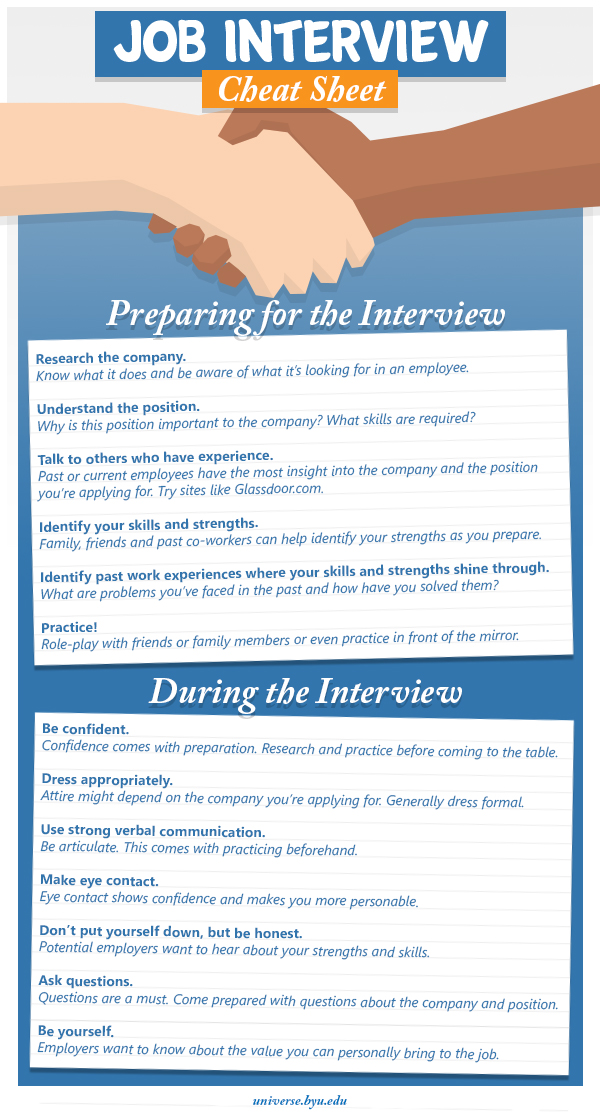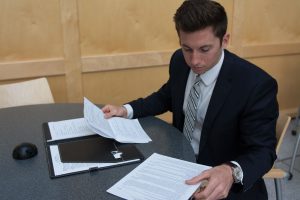 Walking into a job interview prepared can make all the difference when speaking to potential employers, according to talent acquisitions manager Aimee Cooper.
Walking into a job interview prepared can make all the difference when speaking to potential employers, according to talent acquisitions manager Aimee Cooper.
Cooper has sought out potential employees for Vivint for three years. She said interviews are a vital part of the hiring process because they allow employers to see beyond a resume.
“You’ve got to meet with someone face to face,” Cooper said. “Meeting candidates in person helps us gauge them more correctly.”
Adjunct professor Leslie Kawai teaches management communications at BYU. She helps prepare students for jobs and stresses the importance of making a good impression on potential employers.
“You definitely make a first impression within the first thirty seconds to a minute,” Kawai said. “Interviewers make general assumptions around your communication style, your success capacity, your education, your background and your compatibility.”
Before the interview
Kawai believes the intimidation that comes from the interview process is rooted in fear. She said fear is an imaginary construct that can be broken down by preparing in advance and entering an interview with a positive mindset.
BYU senior and finance student Justin Hafen is preparing to start his fourth internship this summer. He will be interning at Price Waterhouse Cooper in Washington, D.C. He too believes the intimidation of a job interview can be combated with thorough preparation.
“I’ve been in interviews where I felt like I wasn’t prepared at all and felt very nervous,” Hafen said. “On the other hand, I’ve done interviews where I knew everything and I wasn’t very nervous at all.”
One of Hafen’s tips for preparing for an interview includes researching the company. He believes keeping up to date with the company’s current events, understanding its culture, and reaching out to people who have worked for the company makes for strong preparation.
Cooper said she has seen this type of preparation set job candidates apart from others at Vivint. She believes preparation leads to confidence.
“One thing that surprises me over and over is how little people know about the company they’re coming to apply for,” Cooper said. “Confidence is huge coming into an interview and confidence comes with knowledge.”

Hafen said the best source of knowledge comes from past and current employees. He often speaks with members of alumni groups who have gone through the same internships he’s applied for. He also browses websites like Glassdoor, where employees post their experiences working at certain companies. He explained resources like these offer valuable insight into the culture and values of a business.
“Every interview process is completely different,” Hafen said. “One of the key points in landing an internship is making sure the company knows you are a good fit for their needs and for their culture.”
During the interview
One of the biggest difficulties people have during an interview is being able to talk about themselves, according to Cooper. She said employers want to see a variety of skills and strengths in potential candidates.
“Tell me about yourself; you’re not going to get a job based off of one skill,” Cooper said. “Reach out to others you’ve worked with before, or a friend or a family member to help you look at your strengths.”
Hafen said he has seen the benefits of preparing to answer questions about himself. Next semester he will be president of the Real Estate Club, a subgroup of the BYU Finance Society, which helps students prepare for and find internship and career opportunities in real estate. They prepare to answer questions about themselves by drawing from past experiences to answer behavioral-based questions, such as what they’d do when dealing with a difficult manager.
“Whenever you’re given a behavioral-based question, you want to be able to give a problem, an action and a result in regards to that question,” Hafen said. “Come up with a problem you’ve experienced, the action you took to solve the problem and the overall result and how it was positive for you.”
Both Cooper and Hafen touched on the importance of mannerisms and appearance, in addition to answering questions. Cooper said one of the best things a candidate can do is make strong eye contact, especially when speaking to more than one interviewer. Likewise, Hafen emphasized the importance of sitting straight in a chair and dressing appropriately for an interview.
More than anything, self-understanding is the most critical part of a job interview, according to Kawai. She said she encourages her students to be themselves by finding a job where they can flourish — something she said can take multiple tries.
“It’s about bringing your highest and best to the table,” Kawai said. “You want to get the job that is right for you. Sometimes that means going through multiple job interviews to get the right fit.”
Cooper explained that employers benefit from the personal traits, experiences and talents of candidates as well. She said these are the most valuable things a person can bring into an interview.
“Overall, just be yourself,” Cooper said. “We like diversity, we thrive off of it. It would be really boring if everyone was exactly the same. I don’t think we’d be as good as we are if we were all the same.”




